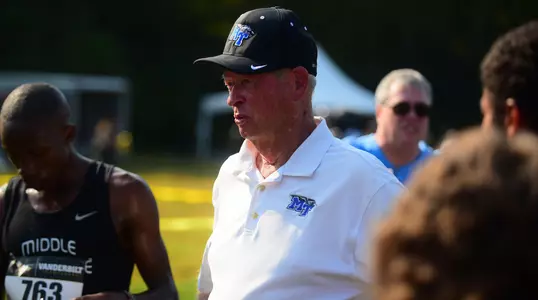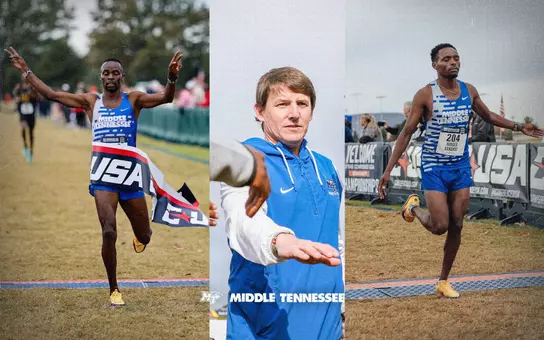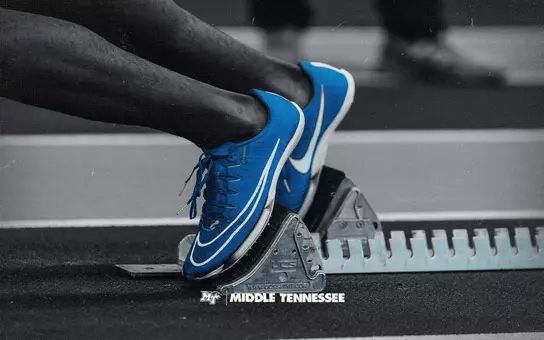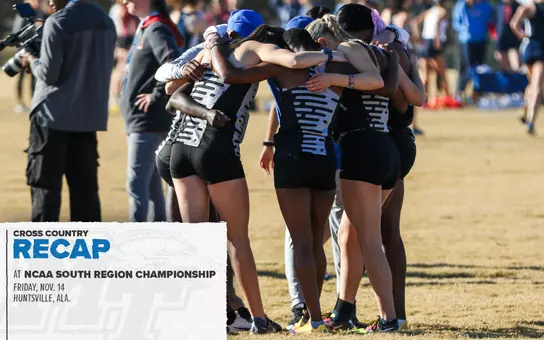Middle Tennessee State University Athletics

Dean Hayes Footprint Creates a Lasting Legacy
3/29/2018 6:00:00 PM | Track & Field/Cross Country
As MTSU men's basketball coach Nick McDevitt took the podium in his introductory press conference Tuesday, one of the things he stressed was sense of community and togetherness.
"Is Coach Hayes here?" McDevitt asked the crowd. "I don't know if I'll be here as long as Coach Hayes has, but I'd like to try. It says a lot about the folks of this community."
Head Coach Dean Hayes can be seen cruising in his golf cart between the Murphy Center and the stadium named in his honor, guiding the men's and women's track program as successfully as he ever has.
Fifty-three years and 52 championships later, the Illinois native's love for the Blue Raiders has made his footprint ever-more important on the Middle Tennessee community.
In 1965, Hayes took over for Joe Black Hayes, who has the same name as his father although they aren't related, and began coaching the men's team. In the span before he took over the women, MTSU saw Barry McClure and Tommy Haynes win national titles in the triple jump three years in a row (McClure in 1972-73, Haynes in 1974) and Hayes was named the Ohio Valley Conference Coach of the Year for 10 straight seasons (1977-1986).
In 1986, the OVC dropped men's track. With uncertainty on the horizon, Hayes took over the women's team as the first full-time coach in 1988, with whom he'd developed a rapport with in the years prior.
"Several of the females on the team before I was actually coaching wanted me to coach them," Hayes said. "I got used to having some of them and they were successful, therefore they wanted me to keep on coaching them and told the others on the team 'Hey, this is what we want.' By having those few when I took over, they were a positive influence on the others."
That positive influence Hayes' displayed on the girls has been felt all over the world.
Hayes has coached in the World University Games in Kobe, Japan in 1985, the World Cup in London in 1994 and the Olympic games in Seoul, South Korea in 1998; just to name a few.
In the summer of 1988, Hayes ran a camp in the mountain community of Davos, Switzerland- just outside of Zurich - before the Olympics. At the camp, Hayes metored the likes of Carl Lewis and Jackie Joyner-Kersee. The chance to develop closer relationships with the olympians paid off, as the U.S. won 13 gold medals in track and field events.
"(The camp) let me have a relaxed atmosphere that let me (spend time) with the athletes," Hayes said. "I knew them and they knew me, but this was more of a personal basis. It developed into some friendships that you don't normally have."
In 1989, Hayes spent time in China running coaching clinics. According to the U.S. Census Bureau, Murfreesboro had a population of 46,929 and the state of Tennessee had 4,967,000 people living under a southern president. China, on the other hand, was living in a communist state and was dealing with the mass-shootings that happened at the Tiananmen Square protests right before Hayes arrived.
"We went in there right after the students revolted against the Chinese government," Hayes said. "I was lucky because I actually ran into a coach who I'd met in 1981 in Romania, and that helped me do all my lectures, so that turned out to be a lot of fun."
Hayes was no stranger to areas in political turmoil, having visited South Korea the year prior. The then 50-year old witnessed the Demilitarized Zone (DMZ) that separated both North and South Korea when the Olympic staff made its way throughout the Korean peninsula.
The large footprint Hayes developed internationally paid off in a way he'd never thought. The area that is infested with mines and barb-wire fencing was patrolled by one of his former hurdlers: Keith Cromartie. After graduation, Cromartie joined the military and was second in charge of the American forces stationed at the DMZ.
"(Cromartie) was the number two person, he and the colonel, and they took us around (the DMZ)," Hayes said. "Keith took me down into one of the tunnels and showed me what that was like."
The once hard-to-reach tunnels Hayes mentioned were dug by North Koreans and resembled what a cool, dark mining tunnel looked like in America. Originally intended to be used for invasive purposes, they now are frequented by tourists.
With Hayes' strong ties built around the world, international athletes have been no stranger to the Middle Tennessee track program.
Currently, the Blue Raiders have 31 men and women from outside the U.S. All of them come from Africa. Thirty Blue Raiders hail from Central Africa, while freshman Braam Bisschop hails from South Africa.
Central Africa has always been close to Hayes. To this day, he continues running a development program in Ghana, where many of his current athletes once honed their skills. Over time, the news of Hayes' program spread like wildfire through the warm African climate. Aside from Ghana, Middle Tennessee has competitors from Nigeria and Kenya.
"Word spreads amongst them so they know who I am and what we do and they look at it positively," Hayes said. "These countries and the athletes from these countries accept me and one tells the other so that's how I make connections with them."
"Done" is a word at this stage in Hayes career that most people use when they refer to him rather than "do". Aside from his 52 conference titles across the OVC, Sun Belt Conference and Conference USA, Hayes has been elected to six hall-of-fames. He's earned 32 coach of the year awards to compliment the 19 NCAA top 25's. Aside from national championship winners Barry McClure and Tommy Haynes, he's coached Dionne Ross and Mardy Scales to national championships in the high hurdles (Ross) and 100 meter dash (Scales). To top it all off, 50 performers have earned 94 All-American honors under Hayes.
The "do" is what keeps the white-haired 80-year old going and ensures the footprints he continues to leave behind on tracks all over the world remind us of how much he means to the MTSU community.
"Athletically, I'd like to earn a trophy from the NCAA where you finish in the top four," Hayes said. "At my age of 80, the idea of helping these athletes get and education and see them leave here and be successful in life and maybe pass some things on. That's what I'd want to be remembered for more than anything else."
"Is Coach Hayes here?" McDevitt asked the crowd. "I don't know if I'll be here as long as Coach Hayes has, but I'd like to try. It says a lot about the folks of this community."
Head Coach Dean Hayes can be seen cruising in his golf cart between the Murphy Center and the stadium named in his honor, guiding the men's and women's track program as successfully as he ever has.
Fifty-three years and 52 championships later, the Illinois native's love for the Blue Raiders has made his footprint ever-more important on the Middle Tennessee community.
In 1965, Hayes took over for Joe Black Hayes, who has the same name as his father although they aren't related, and began coaching the men's team. In the span before he took over the women, MTSU saw Barry McClure and Tommy Haynes win national titles in the triple jump three years in a row (McClure in 1972-73, Haynes in 1974) and Hayes was named the Ohio Valley Conference Coach of the Year for 10 straight seasons (1977-1986).
In 1986, the OVC dropped men's track. With uncertainty on the horizon, Hayes took over the women's team as the first full-time coach in 1988, with whom he'd developed a rapport with in the years prior.
"Several of the females on the team before I was actually coaching wanted me to coach them," Hayes said. "I got used to having some of them and they were successful, therefore they wanted me to keep on coaching them and told the others on the team 'Hey, this is what we want.' By having those few when I took over, they were a positive influence on the others."
That positive influence Hayes' displayed on the girls has been felt all over the world.
Hayes has coached in the World University Games in Kobe, Japan in 1985, the World Cup in London in 1994 and the Olympic games in Seoul, South Korea in 1998; just to name a few.
In the summer of 1988, Hayes ran a camp in the mountain community of Davos, Switzerland- just outside of Zurich - before the Olympics. At the camp, Hayes metored the likes of Carl Lewis and Jackie Joyner-Kersee. The chance to develop closer relationships with the olympians paid off, as the U.S. won 13 gold medals in track and field events.
"(The camp) let me have a relaxed atmosphere that let me (spend time) with the athletes," Hayes said. "I knew them and they knew me, but this was more of a personal basis. It developed into some friendships that you don't normally have."
In 1989, Hayes spent time in China running coaching clinics. According to the U.S. Census Bureau, Murfreesboro had a population of 46,929 and the state of Tennessee had 4,967,000 people living under a southern president. China, on the other hand, was living in a communist state and was dealing with the mass-shootings that happened at the Tiananmen Square protests right before Hayes arrived.
"We went in there right after the students revolted against the Chinese government," Hayes said. "I was lucky because I actually ran into a coach who I'd met in 1981 in Romania, and that helped me do all my lectures, so that turned out to be a lot of fun."
Hayes was no stranger to areas in political turmoil, having visited South Korea the year prior. The then 50-year old witnessed the Demilitarized Zone (DMZ) that separated both North and South Korea when the Olympic staff made its way throughout the Korean peninsula.
The large footprint Hayes developed internationally paid off in a way he'd never thought. The area that is infested with mines and barb-wire fencing was patrolled by one of his former hurdlers: Keith Cromartie. After graduation, Cromartie joined the military and was second in charge of the American forces stationed at the DMZ.
"(Cromartie) was the number two person, he and the colonel, and they took us around (the DMZ)," Hayes said. "Keith took me down into one of the tunnels and showed me what that was like."
The once hard-to-reach tunnels Hayes mentioned were dug by North Koreans and resembled what a cool, dark mining tunnel looked like in America. Originally intended to be used for invasive purposes, they now are frequented by tourists.
With Hayes' strong ties built around the world, international athletes have been no stranger to the Middle Tennessee track program.
Currently, the Blue Raiders have 31 men and women from outside the U.S. All of them come from Africa. Thirty Blue Raiders hail from Central Africa, while freshman Braam Bisschop hails from South Africa.
Central Africa has always been close to Hayes. To this day, he continues running a development program in Ghana, where many of his current athletes once honed their skills. Over time, the news of Hayes' program spread like wildfire through the warm African climate. Aside from Ghana, Middle Tennessee has competitors from Nigeria and Kenya.
"Word spreads amongst them so they know who I am and what we do and they look at it positively," Hayes said. "These countries and the athletes from these countries accept me and one tells the other so that's how I make connections with them."
"Done" is a word at this stage in Hayes career that most people use when they refer to him rather than "do". Aside from his 52 conference titles across the OVC, Sun Belt Conference and Conference USA, Hayes has been elected to six hall-of-fames. He's earned 32 coach of the year awards to compliment the 19 NCAA top 25's. Aside from national championship winners Barry McClure and Tommy Haynes, he's coached Dionne Ross and Mardy Scales to national championships in the high hurdles (Ross) and 100 meter dash (Scales). To top it all off, 50 performers have earned 94 All-American honors under Hayes.
The "do" is what keeps the white-haired 80-year old going and ensures the footprints he continues to leave behind on tracks all over the world remind us of how much he means to the MTSU community.
"Athletically, I'd like to earn a trophy from the NCAA where you finish in the top four," Hayes said. "At my age of 80, the idea of helping these athletes get and education and see them leave here and be successful in life and maybe pass some things on. That's what I'd want to be remembered for more than anything else."
Players Mentioned
MTSU Men's Basketball Cinematic Recap Week 9
Tuesday, January 06
Blue Raider Notebook Presented by TOA - January 5th
Monday, January 05
Blue Raider Breakdown Postgame Show - January 4th - Men's Basketball
Monday, January 05
MTSU Men's Basketball Post Game Press Conference vs Sam Houston 1/4/26
Sunday, January 04



















